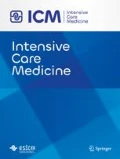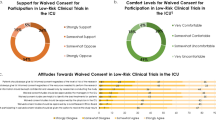Abstract
Objective
A European Union Directive provides for the designation of a surrogate who can consent to or refuse inclusion of an incapacitated patient in research studies. The accuracy with which surrogates consent to research on behalf of patients has not been evaluated in the intensive care unit (ICU).
Methods
A prospective multicenter study was conducted in ten ICUs of the French Famirea study group between July and October 2004. Two hypothetical studies were simultaneously submitted to the patient, surrogate, and physician at the time that the patient was discharged to a ward. One study involved minimal risk and the other greater-than-minimal risk to the patients.
Results
With the minimal risk study there was patient-surrogate discrepancy in 32% of cases and patient-physician discrepancy in 25%. Corresponding figures with the greater-than-minimal risk study were 42% and 46%. None of the collected variables differed significantly between cases with and without patient-surrogate discrepancy.
Conclusions
Family members designated to serve as surrogate decision makers may fail to accurately consent to research for critically ill patients in one-third to nearly one-half of cases.

Similar content being viewed by others
References
Luce JM, Cook DJ, Martin TR, Angus DC, Boushey HA, Curtis JR, Heffner JE, Lanken PN, Levy MM, Polite PY, Rocker GM, Truog RD (2004) The ethical conduct of clinical research involving critically ill patients in the United States and Canada: principles and recommendations. Am J Respir Crit Care Med 170:1375–1384
Silverman HJ, Druml C, Lemaire F, Nelson R (2004) The European Union directive and the protection of incapacitated subjects in research: an ethical analysis. Intensive Care Med 30:1723–1729
Emanuel EJ, Wendler D, Grady C (2000) What makes clinical research ethical? JAMA 283:2701–2711
Lemaire F, Bion J, Blanco J, Damas P, Druml C, Falke K, Kesecioglu J, Larsson A, Mancebo J, Matamis D, Pesenti A, Pimentel J, Ranieri M (2005) The European Union directive on clinical research: present status of implementation in EU member states' legislations with regard to the incompetent patient Intensive. Care Med 31:476–479
Azoulay E, Pochard F, Chevret S, Adrie C, Bollaert PE, Brun F, Dreyfuss D, Garrouste-Orgeas M, Goldgran-Toledano D, Jourdain M, Wolff M, Le Gall JR, Schlemmer B (2003) Opinions about surrogate designation: a population survey in France. Crit Care Med 31:1711–1714
Arnold RM, Kellum J (2003) Moral justifications for surrogate decision making in the intensive care unit: implications and limitations. Crit Care Med 31:S347–353
Coppolino M, Ackerson L (2001) Do surrogate decision makers provide accurate consent for intensive care research? Chest 119:603–612
Luce JM (2003) Is the concept of informed consent applicable to clinical research involving critically ill patients? Crit Care Med 31:S153–S160
Bigatello LM, George E, Hurford WE (2003) Ethical considerations for research in critically ill patients. Crit Care Med 31:S178–S181
Liddell K, Bion J, Chamberlain D, Druml C, Kompanje E, Lemaire F, Menon D, Vrhovac B, Wiedermann CJ (2006) Medical research involving incapacitated adults: implications of the EU clinical trials directive 2001/20/EC. Med Law Rev 23:23
Silverman HJ, Luce JM, Lanken PN, Morris AH, Harabin AL, Oldmixon CF, Thompson BT, Bernard GR (2005) Recommendations for informed consent forms for critical care clinical trials. Crit Care Med 33:867–882
Azoulay E, Chevret S, Leleu G, Pochard F, Barboteu M, Adrie C, Canoui P, Le Gall JR, Schlemmer B (2000) Half the families of intensive care unit patients experience inadequate communication with physicians. Crit Care Med 28:3044–3049
Azoulay E, Pochard F, Chevret S, Jourdain M, Bornstain C, Wernet A, Cattaneo I, Annane D, Brun F, Bollaert PE, Zahar JR, Goldgran-Toledano D, Adrie C, Joly LM, Tayoro J, Desmettre T, Pigne E, Parrot A, Sanchez O, Poisson C, Le Gall JR, Schlemmer B, Lemaire F (2002) Impact of a family information leaflet on effectiveness of information provided to family members of intensive care unit patients: a multicenter, prospective, randomized, controlled trial. Am J Respir Crit Care Med 165:438–442
Lilly CM, De Meo DL, Sonna LA, Haley KJ, Massaro AF, Wallace RF, Cody S (2000) An intensive communication intervention for the critically ill. Am J Med 109:469–475
Davis N, Pohlman A, Gehlbach B, Kress JP, McAtee J, Herlitz J, Hall J (2003) Improving the process of informed consent in the critically ill. JAMA 289:1963–1968
Silverman HJ, Luce JM, Schwartz J (2004) Protecting subjects with decisional impairment in research: the need for a multifaceted approach. Am J Respir Crit Care Med 169:10–14
Azoulay E, Pochard F, Kentish-Barnes N, Chevret S, Aboab J, Adrie C, Annane D, Bleichner G, Bollaert PE, Darmon M, Fassier T, Galliot R, Garrouste-Orgeas M, Goulenok C, Goldgran-Toledano D, Hayon J, Jourdain M, Kaidomar M, Laplace C, Larche J, Liotier J, Papazian L, Poisson C, Reignier J, Saidi F, Schlemmer B (2005) Risk of post-traumatic stress symptoms in family members of intensive care unit patients. Am J Respir Crit Care Med 171:987–994
Pochard F, Darmon M, Fassier T, Bollaert PE, Cheval C, Coloigner M, Merouani A, Moulront S, Pigne E, Pingat J, Zahar JR, Schlemmer B, Azoulay E (2005) Symptoms of anxiety and depression in family members of intensive care unit patients before discharge or death. A prospective multicenter study. J Crit Care 20:90–96
Azoulay E, Pochard F, Chevret S, Adrie C, Annane D, Bleichner G, Bornstain C, Bouffard Y, Cohen Y, Feissel M, Goldgran-Toledano D, Guitton C, Hayon J, Iglesias E, Joly LM, Jourdain M, Laplace C, Lebert C, Pingat J, Poisson C, Renault A, Sanchez O, Selcer D, Timsit JF, Le Gall JR, Schlemmer B (2004) Half the family members of intensive care unit patients do not want to share in the decision-making process: a study in 78 French intensive care units. Crit Care Med 32:1832–1838
Blixen CE, Agich GJ (2005) Stroke patients' preferences and values about emergency research. J Med Ethics 31:608–611
Chenaud C, Merlani P, Ricou B (2006) Informed consent for research in ICU obtained before ICU admission. Intensive Care Med 32:439–444
Dreyfuss D (2005) Is it better to consent to an RCT or to care? Muetadeltaepsilonnu alphagammaalphanu (“nothing in excess”). Intensive Care Med 31:345–355
Truog RD, Robinson W, Randolph A, Morris A (1999) Is informed consent always necessary for randomized, controlled trials? N Engl J Med 340:804–807
Lemaire F (2006) Do all types of human research need ethics committee approval? Am J Respir Crit Care Med 174:363–364
Silverman HJ, Lemaire F (2006) Ethics and research in critical care. Intensive Care Med 32:1697–1705
Pochard F, Azoulay E, Chevret S, Lemaire F, Hubert P, Canoui P, Grassin M, Zittoun R, le Gall JR, Dhainaut JF, Schlemmer B (2001) Symptoms of anxiety and depression in family members of intensive care unit patients: ethical hypothesis regarding decision-making capacity. Crit Care Med 29:1893–1897
Moreau D, Goldgran-Toledano D, Alberti C, Jourdain M, Adrie C, Annane D, Garrouste-Orgeas M, Lefrant JY, Papazian L, Quinio P, Pochard F, Azoulay E (2004) Junior versus senior physicians for informing families of intensive care unit patients. Am J Respir Crit Care Med 169:512–517
Fallowfield L, Jenkins V, Farewell V, Saul J, Duffy A, Eves R (2002) Efficacy of a Cancer Research UK communication skills training model for oncologists: a randomised controlled trial. Lancet 359:650–656
Jenkins V, Fallowfield L, Solis-Trapala I, Langridge C, Farewell V (2005) Discussing randomised clinical trials of cancer therapy: evaluation of a cancer research UK training programme. BMJ 330:400
Author information
Authors and Affiliations
Corresponding author
Additional information
This study was performed on behalf of the Famirea study group. It was supported by grants from the Assistance Publique Hôpitaux de Paris and the French Society for Critical Care Medicine (AOR01004).
Electronic supplementary material
Rights and permissions
About this article
Cite this article
Ciroldi, M., Cariou, A., Adrie, C. et al. Ability of family members to predict patient's consent to critical care research. Intensive Care Med 33, 807–813 (2007). https://doi.org/10.1007/s00134-007-0582-6
Received:
Accepted:
Published:
Issue Date:
DOI: https://doi.org/10.1007/s00134-007-0582-6




